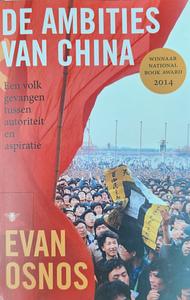Take a photo of a barcode or cover
“Chinese leaders do not threaten to bury America the way Khrushchev did, and even China’s fiercest nationalists do not seek imperial conquest or ethnic cleansing.”
So that sentence didn’t age too well. And I was worried that even though this book was published only 6 years ago it wouldn’t be relevant. But I found it quite interesting. It focuses on the 8 years the author lived in China as a foreign journalist (2005 to 2013) but frequently adds background info from the 90s as well. However I would caution that this book is entirely pre Xi Jinping, and the pace of change in China has continued, so if you’re looking for a book about the most current state of China find something a bit more recent.
So that sentence didn’t age too well. And I was worried that even though this book was published only 6 years ago it wouldn’t be relevant. But I found it quite interesting. It focuses on the 8 years the author lived in China as a foreign journalist (2005 to 2013) but frequently adds background info from the 90s as well. However I would caution that this book is entirely pre Xi Jinping, and the pace of change in China has continued, so if you’re looking for a book about the most current state of China find something a bit more recent.
adventurous
challenging
emotional
funny
informative
reflective
medium-paced
informative
slow-paced
I learned a lot from this book, but it felt very slow & there were more than a few times where I wondered how Osnos chose the people that he highlighted & how he was able to highlight them without making the reader actually hear from them. There was a lot of good information about the disparities and social inequalities viewed from the government & from the people, but I didn't love the writing style & had a hard time focusing on the nonfiction narrative of this one.
Age of Ambition explores the rapid economic and social transformation of China through the lives of individuals striving for success, freedom, and meaning. The book examines the contradictions between state control and personal ambition, highlighting tensions in censorship, corruption, and the pursuit of Western ideals. Through compelling narratives of activists, entrepreneurs, and intellectuals, Osnos provides a nuanced portrait of a nation balancing prosperity with political repression.
I felt like this went far beyond the standard story of China. There's a lot here, and the number of perspectives is pretty broad. It was a little confusing listening to it as an audio book because some of the figures it discusses are called things like Ai, Xi and Hu, pronounced I, She and Who, respectively, so that there was a lot of "Who did X and She did Y" and it all sounded like an extended version of the Who's on First sketch. That and the slightly rambling nature of the narrative made it feel a bit loose, but that aside, it's a good insight into the heart of modern China.
This is an interesting first-person view by a westerner of the changes and trends in China. These developments are complex and difficult to summarize, but here they treated with nuance and useful insight. It helps me to understand the news currently coming out of China, and my own personal experiences traveling there a few years ago.
Absolutely fantastic non-fiction. Reminded me of The Unwinding, which chronicles the slow dissolution of American promise over the past 30 years. One might think China's story is the exact opposite, but its complexities and failings are surprising and deeply though-provoking. Worth reading even if your interest in China is only passing, since it creates room for thought about a million other things.
informative
reflective
medium-paced
I enjoyed this book, mostly the second section. The first section took a while for me to get interested, so I guess maybe as somebody who'd been living in China at around the same time as Mr. Osnos, it seemed boring to recant these things in this way.
The third section wasn't bad, though veered sort of randomly off into a chapter about Chinese Christians that I guess fit in thematically with this idea of a lack of institutions to put faith in but seemed out of place to me anyway.
Overall a book I would not hesitate to recommend to somebody who is maybe a little less familiar with China. For those who are, I'd still give it a recommendation though with more disclaimers I guess.
The third section wasn't bad, though veered sort of randomly off into a chapter about Chinese Christians that I guess fit in thematically with this idea of a lack of institutions to put faith in but seemed out of place to me anyway.
Overall a book I would not hesitate to recommend to somebody who is maybe a little less familiar with China. For those who are, I'd still give it a recommendation though with more disclaimers I guess.
Exceptional writing. Fascinating to see the depth of coverage on a country that is often painted over using a wide brush. There is much internal struggle and nuance within the country. greata profiles with important activists and everyday citizens.




